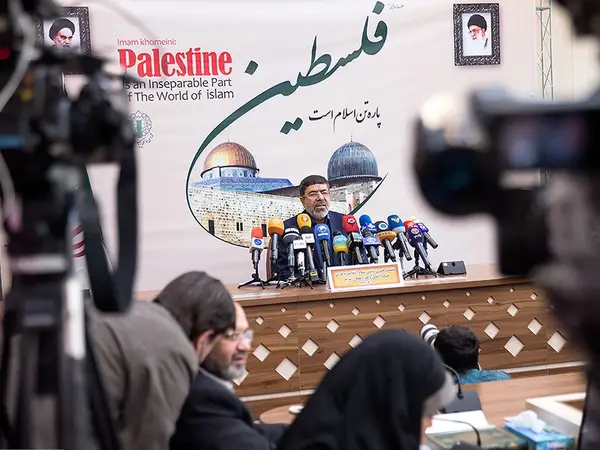Contradicting a statement from the IRGC spokesman, its top commander, Hossein Salami, denied Iran's involvement in Hamas's October 7 invasion of Israel.
“The al-Aqsa Flood operation was completely a Palestinian operation. It was designed and implemented by Palestinians and no decision was made outside of Palestine,” stressed IRGC Commander, Salami, speaking during the funeral service for Razi Mousavi, the IRGC's man in Syria, killed in an alleged Israeli airstrike this week.
“Resistance in Iraq is part of the resistance front [in the region], but acts independently. In Lebanon, Hezbollah acts independently,” Salami went on to say.
However, his comments came a day after Ramezan Sharif, the spokesperson for the IRGC, said the October 7 attack by Hamas on Israel was a retaliatory action for the assassination of Qasem Soleimani, the Iranian regime’s top military and intelligence operator in the Middle East, who was killed in a US drone strike in January 2020 in Iraq.
“The Al-Aqsa Storm was one of the retaliations of the Axis of Resistance against the Zionists for the martyrdom of Qasem Soleimani,” Sharif stated on Wednesday as the contradictions from within the IRGC ranks continued, suggesting Tehran's ongoing denials may be losing traction. Iran has long supported Hamas, with financial and military aid. Last month, Hamas political leader Ismail Haniyeh was in Tehran meeting the Supreme Leader.
The Hamas militant group immediately rejected Sharif’s claim, insisting that the attack on Israel was carried out in response to “Israeli occupation and enduring hostilities against our people and holy sites,” in spite of the fact its top leaders had been in top level meetings with Tehran in the weeks and months leading up to the atrocity.
Trying to unravel the contradictions, on Thursday, Salami openly undermined the IRGC spokesperson’s remarks and said, “We have not yet avenged the assassination of Martyr Qasem Soleimani. We will do this in due time. We sincerely declare what we do and we are not scared.”
Since the beginning of the Israel-Hamas war, the Islamic Republic officials have time and again made contradictory remarks about the conflict. On October 7, the Iranian government immediately praised the invasion and ordered street celebrations, with large banners erected within hours, suggesting Tehran had known in advance of the attacks which killed 1,200 mostly civilians and saw 240 or more taken hostage to Gaza.
However, following the escalation of the conflict and the US move to dispatch its warships to the region, Tehran officials toned down their public rhetoric, with many of them, including Supreme Leader Ali Khamenei, repeatedly denying the Islamic Republic’s role in Hamas’s attack.
Meanwhile, Iran's proxy groups in Lebanon, Iraq, Syria, and Yemen continue to attack Israeli and American targets in the region. Iran's most powerful proxy, Hezbollah, has engaged in the heaviest clashes with Israel for almost 20 years, but has avoided a full-fledged war.
Experts view Hezbollah’s unwillingness to wage an all-encompassing war against Israel as Tehran’s conservative approach to the conflict. Though the Iranian officials vow “great blows” to Israel and the country’s imminent destruction, Tehran has so far refrained from launching any direct attack against Israel and its allies. However, just days ago, the US blamed Iran directly for an attack on a vessel caught up in the maritime front of the war in Gaza.
As recently as Tuesday, an explosion occurred near the Israeli embassy in New Delhi, India. The staff members sustained no injuries in the attack. Though no group has claimed responsibility for the attack, eyes turned once again to Iran and Revolutionary Guard extraterritorial Qods force (IRGC-QF) in the wake of other foiled plots such as one to attack the Israeli embassy in Baku, just a few months ago.
